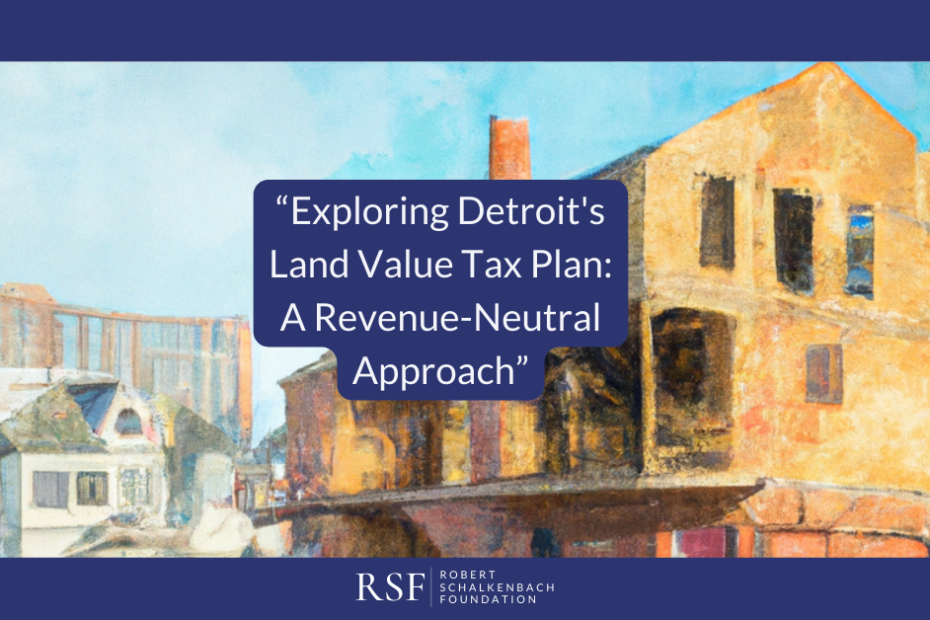Building on the lessons of the roughly 20 Pennsylvania municipalities and school districts that have made use of Land Value Taxes (LVT), Detroit’s Mayor Duggan introduced a proposal to bring the policy to his City in May 2023, during the Mackinac Policy Conference. This plan, which underwent revisions before being formally unveiled in September 2023 and subsequently listed on the City website, aims to reshape Detroit’s tax landscape in a revenue-neutral manner. This blog will delve into the details of the initiative, examining its key features, the protections it offers, and the legislative process it must navigate in both Lansing and Detroit before taking effect.
A Revenue-Neutral Tax Shift
At its core, Duggan’s LVT plan is a revenue-neutral tax shift: it will cut taxes on homes & businesses and replace the revenue with higher taxes on land. The current proposal would reduce the mill rate on buildings (from 67 to 53), while simultaneously increasing the mill rate on land from 85 to 189 mills. This shift will see vacant and underutilized land shouldering a larger share of the tax burden, while maintaining tax revenues, and the City budgets dependent on them, at their current levels. Why tax land values preferentially? The shift is designed to encourage more efficient land use and development, discourage land speculation, and promote the revitalization of underutilized properties.
Protecting Homeowners and Communities
One of the plan’s most important features is the assurance that no homeowner will face a tax increase. On the contrary, fully 97% of homeowners are expected to see a decrease in their property taxes under the LVT plan. This commitment to protecting Detroit’s homeowners is vital in gaining public support for the plan.
The plan also safeguards Detroit’s urban farms and community gardens. These priceless community assets will not see an increase in their tax burden, ensuring that the City’s efforts to promote the revitalization of blighted lots into community green spaces are not harmed under the proposal.
In previous efforts to stabilize and beautify the City, thousands of formerly publicly-owned side lots were sold to homeowners, potentially exposing them to tax increases under an LVT. Recognizing this possibility, the current proposal shields owners of up to four side lots from tax increases.
Preserving Existing NEZ Exemptions
Additionally, Detroit’s LVT plan respects the existing Neighborhood Enterprise Zone (NEZ) exemptions for rehabilitated properties, preserving their pre-existing duration. This is essential for continuing to reward those who rehabilitate decaying homes, and ensuring that those who have already made investments under the NEZ program are not disadvantaged by the new tax structure.
The Legislative Path Ahead
Implementing the LVT plan in Detroit requires legislative approval at the state level. House Bills 4966 to 4970, sponsored by Stephanie Young (D-Detroit) are the critical pieces of legislation needed to allow Detroit to put the LVT plan before voters.
In early October, three votes were held on these bills, but they were pulled before a majority could be reached. The last attempt ended in a deadlock with a 50-50 vote, revealing the complexity and contentious nature of this issue. With 56 votes required, and 10 legislators absent from the chamber, negotiations are ongoing. Not all abstentions were due to skepticism of the LVT plan, with representatives expressing a desire that similar tax policies be permitted in their own cities, such as Carrie Rheingans, a Democrat representing Ann Arbor.
Despite the initial challenges, Democrats anticipate another vote before the Thanksgiving break. The fate of Detroit’s LVT plan will depend on garnering sufficient bipartisan support and addressing concerns raised during the legislative process.
Public Consultation and the Road to November 2024
Importantly, the LVT plan will not be implemented without input and ultimate approval from Detroit residents. Public consultation will take place over the next year, allowing residents to voice their opinions, concerns, and suggestions. Detroit voters will have the final say on this transformative initiative in the November 2024 election. This approach is key to ensuring that Detroit voters have a say in shaping the future of their city.
Conclusion
Detroit’s Land Value Tax plan seeks to reshape the city’s landscape in a revenue-neutral manner, encouraging growth while protecting homeowners and community assets. Success of the plan hinges on navigating the legislative process in Lansing and gaining further support from house representatives. If the plan passes, it will ultimately mark a significant milestone in the city’s ongoing revitalization efforts.

